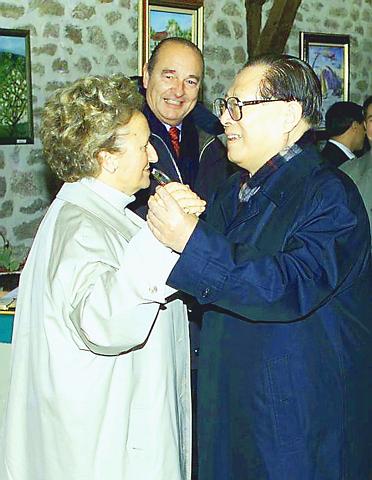Visiting Chinese President Jiang Zemin told his host, French president Jacques Chirac, that China intends to ratify the nuclear weapons test ban treaty, rejected by the US senate earlier this month.
``Our objective is to obtain the ratification of this treaty,'' the French presidency's spokeswoman Catherine Colonna quoted the Chinese leader as saying during breakfast at president Chirac's countryside chateau. China's parliament has already made an initial examination of a ratification project, she added. Jiang said that China wants to ratify the nuclear weapons test ban treaty to help ``permit to create a more peaceful world,'' Colonna said.
Chirac had expressed his ``consternation'' at the US senate's Oct. 13 refusal to ratify the treaty, and Colonna said that Jiang had the same reaction.

PHOTO: REUTERS
In talks with his French counterpart, Jiang said his country would move ``step by step'' toward democracy with an eye to maintaining the nation's stability, Colonna said yesterday.
Jiang explained his approach to democracy during three hours of talks Saturday evening with Chirac, who hosted the Chinese leader at his estate in the Correze region, in the heart of France, on the second day of a five-day visit to the country.
The first two days were billed as a ``personal'' visit, with the state visit starting later yesterday when Jiang, on a two-week foreign tour that began in Britain, was to arrive in Paris.
But first, he enjoyed the pleasures of the French countryside, dancing to accordion music with French First Lady Bernadette Chirac at a local fair in the town of Chaumeil.
The night before, at Chirac's Chateau Bity, more serious matters were on the agenda.
Chirac expressed his concern about respect for democracy and political and religious freedoms, said Colonna.
Jiang in turn expressed ``his wish for his country to make progress step by step in this direction (toward democracy) without putting into question the stability of an ensemble of more than a billion inhabitants,'' Colonna said.
On the question of Chinese-occupied Tibet, the two men discussed the ``conditions of a dialogue'' between Chinese authorities and the Dalai Lama.
Colonna described the talks as ``deep, free and frank'' and said that Jiang remarked that the conversation was ``the deepest he has had with a foreign leader on this subject.''
Chirac, she added, was ``convinced that China will not remain at the side of the world's great evolutionary movement.''
Chirac has come under severe criticism from Chinese dissidents, human rights groups and some French politicians for inviting Jiang to his personal country estate, the first time such an invitation was extended to a foreign leader.
China and France meanwhile announced a ``hot line'' between their two nations described as a ``direct, secure telephone line permanently open,'' Colonna said. France currently has such lines with Washington and Moscow.

BUILDUP: US General Dan Caine said Chinese military maneuvers are not routine exercises, but instead are ‘rehearsals for a forced unification’ with Taiwan China poses an increasingly aggressive threat to the US and deterring Beijing is the Pentagon’s top regional priority amid its rapid military buildup and invasion drills near Taiwan, US Secretary of Defense Pete Hegseth said on Tuesday. “Our pacing threat is communist China,” Hegseth told the US House of Representatives Appropriations Subcommittee on Defense during an oversight hearing with US General Dan Caine, chairman of the Joint Chiefs of Staff. “Beijing is preparing for war in the Indo-Pacific as part of its broader strategy to dominate that region and then the world,” Hegseth said, adding that if it succeeds, it could derail

CHIP WAR: The new restrictions are expected to cut off China’s access to Taiwan’s technologies, materials and equipment essential to building AI semiconductors Taiwan has blacklisted Huawei Technologies Co (華為) and Semiconductor Manufacturing International Corp (SMIC, 中芯), dealing another major blow to the two companies spearheading China’s efforts to develop cutting-edge artificial intelligence (AI) chip technologies. The Ministry of Economic Affairs’ International Trade Administration has included Huawei, SMIC and several of their subsidiaries in an update of its so-called strategic high-tech commodities entity list, the latest version on its Web site showed on Saturday. It did not publicly announce the change. Other entities on the list include organizations such as the Taliban and al-Qaeda, as well as companies in China, Iran and elsewhere. Local companies need

CROSS-STRAIT: The MAC said it barred the Chinese officials from attending an event, because they failed to provide guarantees that Taiwan would be treated with respect The Mainland Affairs Council (MAC) on Friday night defended its decision to bar Chinese officials and tourism representatives from attending a tourism event in Taipei next month, citing the unsafe conditions for Taiwanese in China. The Taipei International Summer Travel Expo, organized by the Taiwan Tourism Exchange Association, is to run from July 18 to 21. China’s Taiwan Affairs Office spokeswoman Zhu Fenglian (朱鳳蓮) on Friday said that representatives from China’s travel industry were excluded from the expo. The Democratic Progressive Party government is obstructing cross-strait tourism exchange in a vain attempt to ignore the mainstream support for peaceful development

ELITE UNIT: President William Lai yesterday praised the National Police Agency’s Special Operations Group after watching it go through assault training and hostage rescue drills The US Navy regularly conducts global war games to develop deterrence strategies against a potential Chinese invasion of Taiwan, aimed at making the nation “a very difficult target to take,” US Acting Chief of Naval Operations James Kilby said on Wednesday. Testifying before the US House of Representatives Armed Services Committee, Kilby said the navy has studied the issue extensively, including routine simulations at the Naval War College. The navy is focused on five key areas: long-range strike capabilities; countering China’s command, control, communications, computers, cyber, intelligence, surveillance, reconnaissance and targeting; terminal ship defense; contested logistics; and nontraditional maritime denial tactics, Kilby